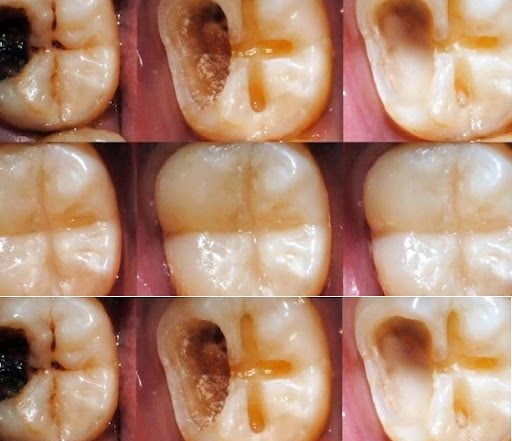
It’s important to clarify that while a healthy diet and good oral hygiene can help prevent cavities and may aid in the remineralization of teeth in very early stages, once a cavity has formed, it cannot be completely “repaired” naturally at home. Cavities are permanent damage to the tooth enamel that typically require dental intervention to treat.

These provided here aims to offer guidance on how to support oral health and potentially slow the progression of early tooth decay, but it should not replace professional dental advice and treatment.
Naturally Supporting Oral Health to Combat Early Tooth Decay
Cavities are a widespread issue, often leading to discomfort and pain. They occur when tooth enamel is compromised. While early stages of tooth demineralization can be addressed with dietary changes and improved oral hygiene, established cavities usually need professional dental treatment.
Tips for Supporting Oral Health:
Boost Mineral Intake: Cavities can signal a lack of essential minerals in your diet. Focus on eating mineral-rich foods such as seafood, organic dairy products, leafy greens, and incorporating healthy fats like coconut oil.
Limit Phytic Acid: Foods high in phytic acid, such as grains, beans, nuts, and seeds, can hinder mineral absorption. Reducing their intake may benefit your teeth.
Reduce Processed Foods: These can affect blood sugar levels and overall health, impacting oral wellness.
Adopt a Low Sugar and Starch Diet: Sugary and starchy foods can feed harmful bacteria in your mouth, producing acids that erode tooth enamel. If you do consume them, try to do so during main meals rather than snacking throughout the day to minimize exposure to these acids.
Oral Hygiene and Fluoride: Regular brushing with fluoride toothpaste, flossing, and using mouthwash can help protect your teeth. Fluoride helps remineralize enamel at the very early stages of decay.
Regular Dental Check-ups: Early detection of tooth decay and professional advice from a dentist are crucial for maintaining oral health.
Understanding Cavities and Their Causes:
Cavities form when the enamel is eroded away, leading to permanent damage. This process is influenced by diet, oral hygiene practices, fluoride exposure, and even genetics. Untreated cavities can lead to more severe dental issues, including abscesses.
Detecting Cavities:
Only a dental professional can accurately diagnose cavities, often developing in areas not visible to the naked eye. Carbohydrate-rich foods can exacerbate the issue by feeding plaque-forming bacteria, which produce enamel-eroding acids.
Prevention through diet, oral hygiene, and regular dental visits is key to managing oral health. If you suspect you have a cavity or are experiencing dental discomfort, it’s crucial to consult with a dentist for a proper evaluation and treatment plan.
While certain measures can support oral health, professional intervention is often necessary to address cavities effectively.
News
“Guilty as Charged!” – The Chilling First Words of Caitlin Clark’s Alleged Stalker in Court
A jaw-dropping moment has erupted online as a video surfaces showing the first words spoken in court by Michael Thomas Lewis, the man accused of stalking WNBA…
‘No way’ – Sophie Cunningham turns heads with Caitlin Clark-inspired outfit before Indiana Fever go on to lose
WNBA star Sophie Cunningham stunned fans with a Caitlin Clark-inspired outfit before their team’s eventual loss on Sunday. Cunningham, 28, has been in the spotlight since…
Sophie Cunningham slams WNBA referees for not protecting ‘star player’ Caitlin Clark after Indiana Fever bust-up
WNBA star Sophie Cunningham has launched a stunning attack on referees for failing to protect the league’s top talent. The 28-year-old Indiana Fever guard has been dubbed Caitlin…
New Gruesome Slo-Mo Video Shows Close-Up Of Tyrese Haliburton’s Achilles Exploding During Game 7 Of NBA Finals, And It Does Not Look Good
Tyrese Haliburton only had one more game to play this season, and he won’t be able to finish it. In the first quarter of Game 7 against the…
Simone Biles Speaks Out After Slamming Riley Gaines for Her Views on Transgender Athletes
Simone Biles is speaking out again after she slammed Riley Gaines for her views on transgender athletes in sports. Biles, 28, posted a lengthy message on X on Tuesday, June 10,…
Stephen A. Smith blew up the screen by calling Angel Reese a “jealous bully,” exposing her foul play and Caitlin Clark’s teasing. The backlash turned Reese into the WNBA’s new “villain” and fueled the question: Will her career crash before it really takes off?
The burgeoning rivalry between Angel Reese and Caitlin Clark has become a defining narrative of the early WNBA season, carrying the intensity of their college battles into…
End of content
No more pages to load







